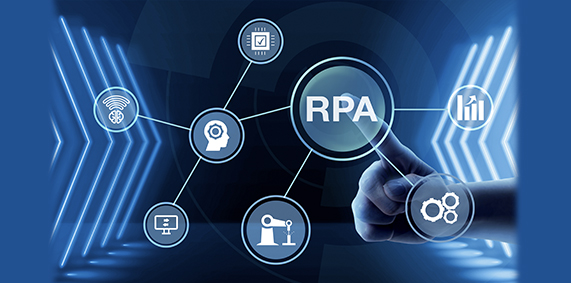In the rapidly evolving digital landscape, businesses are constantly seeking ways to enhance efficiency, cut costs, and stay ahead of the competition. One of the most effective strategies for achieving these objectives is through process automation—a technology that has advanced significantly over the years. With the incorporation of Artificial Intelligence (AI) and Robotic Process Automation (RPA), process automation is transforming from a basic task optimization tool to a groundbreaking approach to business operations. This blog delves into the future of process automation, highlighting how AI-powered solutions are driving unprecedented levels of business efficiency.
The Journey of Process Automation
Process automation has evolved substantially from its early days when it was primarily used for simple, repetitive tasks that required minimal human intervention. Initially, businesses adopted automation to streamline rule-based operations such as data entry, payroll processing, and order management. These early systems were limited in functionality, mainly serving back-office operations.
However, as technology advanced, so did the capabilities of process automation. Today, process automation services are integral to various organizational functions, including customer service, supply chain management, marketing, and sales operations. The advent of AI and RPA has further accelerated this evolution, enabling businesses to automate complex processes that involve decision-making, pattern recognition, and predictive analytics.
The Impact of Artificial Intelligence on Process Automation
Artificial Intelligence (AI) has significantly enhanced the potential of process automation technology. Unlike traditional automation, which relies on predefined rules and workflows, AI-powered automation can learn, adapt, and improve over time. This ability allows AI-driven automation to handle more complex tasks that require decision-making akin to human reasoning.
A key advantage of AI in process automation is its capacity to analyze large volumes of data quickly and accurately. AI algorithms can identify patterns, draw insights, and make predictions far beyond human capabilities in the same timeframe. This is particularly beneficial in sectors like finance, where AI can detect fraudulent activities, and healthcare, where AI can assist in diagnosing diseases based on patient data.
Moreover, AI-powered automation systems continuously improve as they process more data, leading to enhanced decision-making, increased efficiency, reduced error rates, and lower operational costs. These systems can work alongside human employees, complementing their capabilities rather than replacing them, creating a synergistic relationship that is central to the future of process automation.
The Emergence of Robotic Process Automation (RPA)
Robotic Process Automation (RPA) is another vital element of modern process automation technology. RPA involves software robots or “bots” that mimic human actions to automate repetitive tasks. These bots can interact with various software applications, input data, perform calculations, and communicate with other systems.
RPA is particularly effective for automating rule-based, repetitive, and time-consuming tasks. For instance, an RPA bot can automate invoice generation and sending, employee onboarding, or customer order processing. Automating these routine tasks allows businesses to free up their workforce for more strategic, value-added activities.
One of RPA’s significant advantages is its ability to integrate with existing systems without requiring extensive changes to the underlying infrastructure. This makes RPA an appealing option for businesses seeking to implement automation quickly and cost-effectively. Furthermore, RPA is highly scalable, allowing businesses to start with small-scale automation and expand as needed.
However, the real power of RPA is unleashed when it is combined with AI. AI-driven RPA can manage more complex processes involving decision-making, natural language processing, and image recognition. This blend of AI and RPA, known as “Intelligent Automation,” is the future of process automation services.
Advantages of AI-Powered Process Automation
Integrating AI and RPA into process automation technology provides numerous benefits to businesses, including:
- Enhanced Efficiency: AI-powered automation can execute tasks faster and with greater accuracy than humans, leading to significant time savings and increased operational efficiency. This is especially crucial in industries like finance, healthcare, and manufacturing, where even minor efficiency improvements can substantially impact profitability.
- Cost Savings: Automating repetitive tasks reduces the need for manual labor, leading to lower operational costs. Additionally, AI-driven automation can pinpoint inefficiencies in existing processes and recommend optimization strategies, further reducing costs.
- Improved Accuracy: AI-powered automation minimizes the risk of human error, particularly in data entry, calculations, and decision-making tasks. This leads to more accurate outcomes, reducing the need for costly rework or corrections.
- Scalability: AI and RPA are inherently scalable, allowing businesses to expand their automation initiatives as required. This scalability enables companies to start small and gradually increase automation as they become more comfortable with the technology.
- Enhanced Customer Experience: AI-powered automation can significantly improve customer service by providing faster response times, more accurate information, and personalized experiences. For example, AI-driven chatbots can handle customer inquiries 24/7, offering immediate support and reducing the need for human intervention.
- Data-Driven Decision-Making: AI-powered automation can quickly and accurately analyze large datasets, providing businesses with valuable insights that inform decision-making. This is particularly useful in areas like marketing, where AI can analyze customer behavior and suggest targeted campaigns.
- Fostering Innovation: By automating routine tasks, businesses can redirect resources towards innovation and strategic initiatives. This increased focus on innovation allows companies to be more agile and responsive to market changes, giving them a competitive edge.
Future Trends in Process Automation
As process automation technology continues to advance, several key trends are expected to shape its future:
- Hyperautomation: Hyperautomation involves using advanced technologies such as AI, RPA, and machine learning to automate as many business processes as possible. The goal is to create a fully automated enterprise where AI-powered systems manage everything from routine tasks to complex decision-making. This trend is expected to drive significant growth in the process automation market in the coming years.
- AI-Driven Decision-Making: As AI technology evolves, more businesses are expected to utilize AI-powered automation for complex decision-making tasks. This could range from financial forecasting and risk management to supply chain optimization and customer segmentation. AI-driven decision-making has the potential to revolutionize industries by providing businesses with more accurate and timely insights.
- Intelligent Document Processing (IDP): Intelligent Document Processing (IDP) is an emerging trend in process automation that uses AI to extract, classify, and process data from unstructured documents. This technology is particularly valuable in industries such as finance, healthcare, and legal, where businesses deal with large volumes of documents that need to be processed quickly and accurately.
- Integration of AI and RPA: The combination of AI and RPA, known as Intelligent Automation, is expected to become increasingly prevalent. Intelligent Automation can handle more complex processes involving decision-making, natural language processing, and image recognition. This trend is expected to drive significant growth in the process automation services market.
- AI-Driven Personalization: AI-powered automation enables businesses to deliver more personalized customer experiences. This includes everything from targeted marketing campaigns to customized product recommendations. As AI technology advances, we can expect even more sophisticated personalization capabilities.
- Human-AI Collaboration: Instead of replacing human workers, AI-powered automation is anticipated to collaborate with employees, enhancing their productivity. This trend, known as “human-AI collaboration,” is likely to play a significant role in the future of process automation.
Codely Ai’s Role in the Future of Process Automation
As businesses navigate the future of process automation, they need a partner that understands AI-powered solutions’ complexities and can guide them through the implementation process. Codely Ai is at the forefront of process automation technology, offering services that help businesses unlock new levels of efficiency and productivity.
Codely Ai specializes in delivering cutting-edge process automation services that leverage AI and RPA’s power. Our team of experts collaborates closely with clients to understand their unique needs and develop customized solutions that deliver tangible results. Whether you aim to automate routine tasks, optimize complex processes, or harness AI for decision-making, Codely Ai has the expertise and technology to help you succeed.
Codely Ai: Leading the Charge in AI-Powered Process Automation
The future of process automation is promising, with AI-powered solutions leading the charge in transforming business operations. By adopting process automation technology, businesses can achieve new levels of efficiency, reduce costs, and maintain a competitive edge in an increasingly digital world. With Codely Ai’s support, your business can leverage AI and RPA to stay ahead of the curve and drive innovation.
As we move forward, it’s evident that process automation will continue to play a pivotal role in shaping business operations. The integration of AI, RPA, and other advanced technologies will enable businesses to achieve greater efficiency, accuracy, and scalability. At Codely Ai, we are excited to be part of this journey, helping businesses unlock their full potential through process automation.
For more information on how Codely Ai can help your business thrive in the age of AI-powered automation, visit our website at https://codely.ai/.


